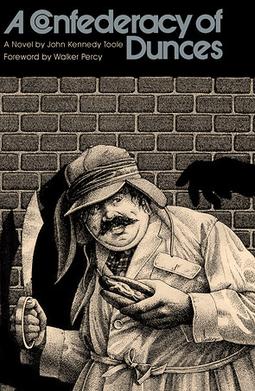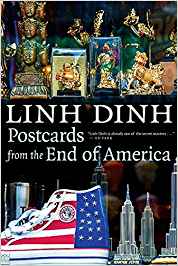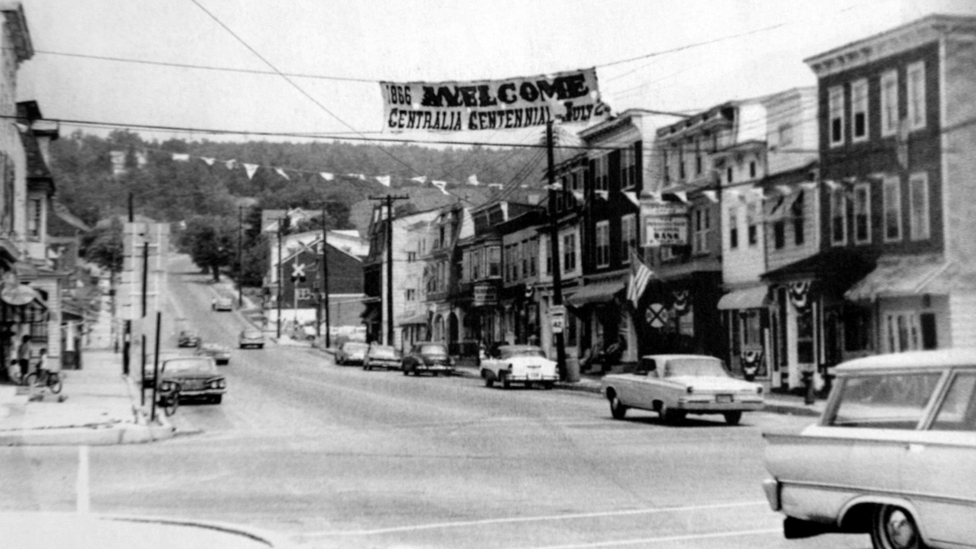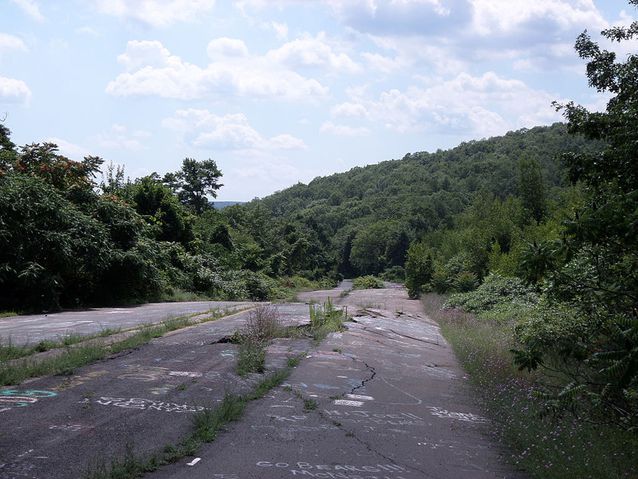 Linh Dinh, Postcards from the End of America, Seven Stories, 2017.
Linh Dinh, Postcards from the End of America, Seven Stories, 2017.
A masterly saga of a broken nation, Linh writes his Postcards from the End of America as he moves from town to town by rail and bus, with lots of walking, each one anchored by a theme, sort of, though what stands out are the deftly sketched portraits of mostly down-and-out survivors of the pressure cooker America, seething and occasionally exploding in violence and collapse.
What is powerful is the intensely personal look inside the beast. Linh calls himself "a Unapoet",* a "PayPal-buttoned, reader-supported blogger". He writes with care and at the same time, abandon, occasionally losing it with angry Unabomber** diatribes. But given the subject matter, it’s hard to fault him. In an interview with Diacritics, he calls it "a diary of America’s ongoing collapse, and I’ve learnt much from roaming around." A kind of Unatourism.
There are lots of American road books and movies: Easy Rider (1969) and Fear and Loathing in Las Vegas: A Savage Journey to the Heart of the American Dream (1971). Linh has been compared to Bukovsky, but identifies more with Rabelais and Artaud. He makes me think of Studs Terkel, but with a bite. From Louis-Ferdinand Celine, "I learnt that a writer should never flinch." You will say "Ouch!" more than once in Postcards, while seeing Linh's Buddha-like composure in your mind's eye.
These vignettes of life in America, many first published at Unz.com, paid for via crowdfunding, recall Wim Wenders’ Road Movie Trilogy and Paris, Texas, meditations on the bizarro faux reality of postwar US, but laced with strychnine. The US has served as the petri dish for capitalism in its purest form, built on the bones of the natives and slaves, carved in the marble of enlightenment thinking.
There was no looking back after 1776, unlike the French revolution in 1789, which exploded in its face early on and quickly moved back to constitutional monarchy, before its leap into communism a century later in 1871, and on to a humdrum welfare state a century after that. The US staved off socialism til the 1930s, and by then, corporate 'democracy' proved itself powerful enough to keep it on its road to capitalist oblivion. Linh is no fan of 1776 and he makes his case in terrifying detail.
Linh is also an echo of New Orleans’ John Kennedy Toole, author of A Confederacy of Dunces (1963), the book's title referring to an  epigram from Jonathan Swift's essay Thoughts on Various Subjects, Moral and Diverting: "When a true genius appears in the world, you may know him by this sign, that the dunces are all in confederacy against him." This is fitting, as Linh is studiously ignored by the mainstream, much as Toole was. Fortunately, Linh has more social smarts,*** and much as he despises our electronic 1984, he was able to publish and self-fund via PayPal.
epigram from Jonathan Swift's essay Thoughts on Various Subjects, Moral and Diverting: "When a true genius appears in the world, you may know him by this sign, that the dunces are all in confederacy against him." This is fitting, as Linh is studiously ignored by the mainstream, much as Toole was. Fortunately, Linh has more social smarts,*** and much as he despises our electronic 1984, he was able to publish and self-fund via PayPal.
New Orleans squatters
His Postcard from New Orleans is anchored by the theme of petty criminality and its “justification for sustaining one's soul, though not necessarily one's body.” It lands us on Elysian Fields Avenue, near Arts and Desire streets, immortalized by another New Orleans great, Tennessee Williams. “You can drink rum concoctions such as All Night Long, Suicide, Sweet Dreams and What the Fuck at Gene's Curbside Daiquiris.”
Elysian Fields is hardly a paradise, with eight lanes of death machines hurtling along, including two for parking. Linh went there to hang out with Brooks Johnson and his squatters, Linh’s ‘petty criminals’. Brooks was teaching at Delgado Community College but was 'let go'. He still owes $12,000 in student loans.
Linh: Not too bad, comparatively.
Brooks: But still bad, because before you know it, it will become 20. They have to keep you tied in and borrowing from the banks.
Linh: If students really suck at what they do, then they should be told to cut their losses right now, rather than be led on so cynically by those pretending to be nurturing. But if profs did that, they would be fired or would end up unemployed.
Higher education in the US is a Ponzi scheme. As if this isn’t bad enough, foreign professional workers, as in engineers, doctors and nurses, etc., are also being imported to knock wages down. Though this is done deliberately to benefit employers, it’s cloaked as a benevolent immigration policy so that anyone who questions it is accused of being a racist. Brooks was tutoring one-on-one, talking about life and what's going on.
Linh: you weren't a good soldier, man!
Brooks' squatters are in the tradition of New Orleans Batture Dwellers, who, during the Great Depression, squatted on a precarious strip of land between levees and riverbank, swept away during a storm, but returning with their goat and chickens to rebuild their shacks. Tennessee Williams, too, had to hightail it from his landlady with no rent money, a kind of upscale (white) squatting.
Turnstile-jumping or train-hopping young writers usually get away with it, and don't get long sentences, so this petty theft is an important safety valve allowing some freedom in a wholly monetized culture. There are just too many penniless citizens for the authorities to do more than mopping up operations, like the mountain-bike-riding cops of Portland Oregon, who rouse the homeless every morning at dawn so the day’s commerce can commence. By the airport, a tent city called Dignity Village has existed since late 2000.
So the great American tradition of Hoovervilles continues, open defiance of private property. In fact, now immortalized by the Occupy Now movement, which Linh despises for embracing the homeless lifestyle, their non-goals echoing the non-demands of that failed movement. Instead of fighting back, American rebels not only embrace their disenfranchisement, but consider this defeat a victory. Now as then, many of them occupy city parks, while their overlords sneer down at them from surrounding bank towers.
Linh talks with a young Occupy camper in Portland's Chapman Square. A pleasant 20-something, he has been homeless for a couple of years: I get by on food stamps, and I couch-surf. I don’t really use money anymore.”
Linh: Time magazine had ‘The Protester’ as its 2011 Person of the Year. If the mainstream media can chuckle and affectionately muss up your dreadlocks like that, it means you’re no threat to the status quo.
Linh recalls the very different reaction to these Hoovervilles, culminating in the beating, killing and arrests of veterans marching on Washington, the Bonus Army, in 1932. They were a threat and embarrassment, and were brutally put down by MacArthur and Eisenhower. In an image-dominated society, public relations is everything, so the most crucial task is to maintain a sexy or dignified appearance, and to hell with what happens behind the scenes.
Nostalgia for the Crown
Back to 1776, Linh, who chose to live in Philadelphia, the birthplace of US democracy, recalls nearby Bensalem’s founder Joseph Galloway, one of the wealthiest and most respected citizen-politicians in pre-revolutionary America. He was against revolution. He wanted reform, parliamentary representation under the Crown, arguing that British defense was needed and the colonies were too divided. He had to abandon everything and flee for his life to England. No room for dissent, though the declaration of independence was a call for liberty, and the first amendment to the constitution was to ensure freedom of speech.
As a Canadian, reading Postcards merely confirms my distrust of the revolution to the south. Though our natives suffered much the same fate as those Linh meets in Wolf Point, their suspicions of the revolution and their support for the British both in 1776 and 1812 were well founded. There is no Canadian equivalent of the shocking reality of the reservation at Wolf Point, with the main street honouring General Custer (despite the reservation chief asking the town council to change it to Crazy Horse),**** just as there was no Wounded Knee. While racism is still rampant in the US, it is much less so in Canada, and natives are already 'rehabilitated', holding an honoured place in Canadian society. We are watching the descent into the abyss from outside, though our proximity is frightening, threatening.
 Advice for readers
Advice for readers
Don't expect to rush through this epic journey in a few days. It took Linh 3 years to hone. The slower you go, the more you see and feel. I almost gave up a few times, surfeited on Linh's passionate angst, not needing converting. The vignettes blur when swallowed in too big bites. But then I recalled touching moments, vividly sketched in a few words, incarnating before you a bereft widow or mother mourning her son, a victim of 'the system', uncomprehending. Sometimes the bile takes over, but, hey!, letting off steam once in a while is ok. I'm looking forward to a second read.
Linh is a poet, and his prose is diamond-hard and imaginative. Have your computer handy for background from Wikipedia. Pokey little towns come to life, but Linh makes you do the work, pushes you to look further. He moves through America with his history antennae on alert, looking for glimpses of the past, allusions to what might have been, what was, but is now obliterated. His own story inspired his writing: born in Saigon in 1963, a Vietnam refugee, forged in the heat of war, flotsam washed up on Guam, settling on the east coast, a Philadelphian who cherishes the peaceful intent of William Penn in nurturing an enlightenment utopia in the new Jerusalem.
Postcards reads as his eulogy/ epitaph to America as it teeters on the edge of the abyss, blind to its impending doom, suffering a castration complex, a double castration when the twin towers fell, broadcast live to the entire world. One of our bravest dissidents, Bradley Manning, also wishes to have nothing between his legs, as does Bruce Jenner, who dreams of the day he will finally be emasculated.
Looking for answers
Natives are a travesty of what they used to be, mired as they are in misery and aimlessness. After the Indian has been killed, only an addicted and defeated American has emerged, but this is hardly the final chapter, for as the US itself becomes broken, the red man’s resilience, resourcefulness, probity, simplicity and toughness will resurface to help lead us all out of this glammed-up face. Benjamin Franklin remarked that
Indian Men, when young, are Hunters and Warriors; when old, Councillors; for all their Government is by Counsel of the Sages; there is no Force, there are no Prisons, no Officers to compel Obedience, or inflict Punishment. Hence they generally study Oratory, the best Speaker having the most Influence. Having few artificial Wants, they have abundance of Leisure for Improvement by Conversation. Our laborious Manner of Life, they esteem slavish & based, and the Learning on which we value ourselves, they regard as frivolous & useless.
Linh is disdainful of both left and right, at the same time, demanding revolution or at least collapse of the empire. The latter could take a long time, if Gibbon’s Decline of the Roman Empire is any help, and if Occupy Now is a bust along with politics and unions, where to?
What about Thích Nhất Hạnh (1926), Vietnam's most prominent Buddhist monk, nominated by Martin Luther King for the Nobel Peace prize in 1967 (no award made that year)? Like Linh, Thich returned to Vietnam in 2018. He has a message for Linh -- his Engaged Buddhism, which applies insights from meditation practice and dharma teachings to social, political, environmental, and economic suffering and injustice.
Linh doesn't mention Islam, apart from noting a Muslim holding a poster among other demonstrators near the White House. His Pakistani immigrant friend in Bensalem, Anwar, is a pathetic devotee of the American Dream, selling trinkets and gambling on the stock market, wife and kids bona fide American slobs. No mention of his Muslim heritage. But given Linh’s shopping list of evils -- racism, drugs, promiscuity, soullessness, desperation, imperialism -- it is an alternative, as Trump realizes.
Linh’s antennae for change focus on what the elites attack as dangerous to them. It is Muslims who are feared by Trump et al for not accepting his shopping list. Trump can close off immigration to Muslims but it will do no good. Millions of Americans are Muslim and the rate of conversion is robust (imagine a Muslim USA). As the forces of evil empire attack the Muslim world, they will continue to be in the headlines, both as enemies to empire and friends to anti-empire (Saudis aside).
Neither Islam nor Buddhism in practice are above criticism, but neither have been associated with the imperialist crimes of both Christianity and Judaism in the 20th century. As the US and Israel continue their dance of death, Christians and Jews, too, are beginning to reject them. The spiritual emptiness that Linh reveals in his Postcards cries out for a renewed moral force which religion offers and enlightenment secularism lacks.
End of the road
Linh’s Postcards are portraits capturing the humanity of people suffering the disintegration of their society, and as such are both chilling and warm, hideous and beautiful. They and the other 50% of Americans living at or below the poverty line will soon be gone and forgotten, but Linh’s poetic portraits will remain as testament to their lives and hopes. His final Postcard, Centralia, needs no words.*****


xxx
*I will quote liberally from Postcards, so will dispense with quotation marks for the most part. Linh’s style should shine through.
**The FBI used the acronym UNABOM (University and Airline Bomber) to refer to Theodore John Kaczynski who, between 1978 and 1995, planted 17 bombs, killing three people and injured 23 others in an attempt to start a revolution by conducting a nationwide bombing campaign targeting people involved with modern technology. He is serving 8 life sentences. In 2016, it was reported that early on in his imprisonment Kaczynski had befriended Ramzi Yousef and Timothy McVeigh, the perpetrators of the 1993 World Trade Center bombing and the Oklahoma City bombing, respectively. The trio discussed religion and politics and formed a friendship which lasted until McVeigh's execution in 2001.
***Toole committed suicide after his novel was rejected, but gained notoriety and a posthumous Pulitzer Prize for Fiction in 1981, and is now considered a canonical work of modern literature of the south. Warming to Linh: Watch out!
****The statue in the town centre is a tribute to settlers.
*****OK! Some words: A coal mine fire started by (illegally) dumping waste in an open strip mine started in 1962, burning 300 feet deep over an 8-mile stretch. It could continue to burn for over 250 years, probably more devastating than Chernobyl, but now a tourist attraction.





